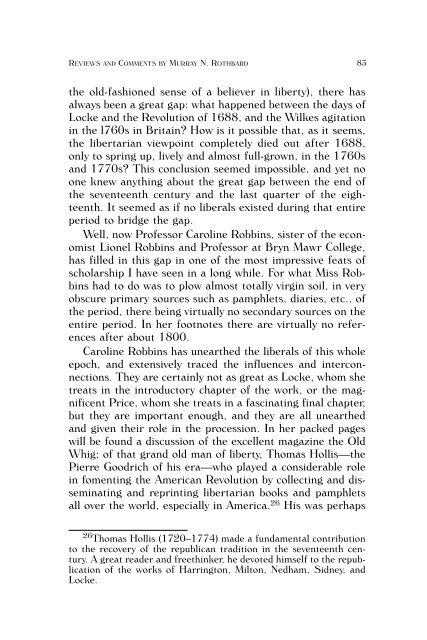Murray N. Rothbard vs. the Philosophers - Ludwig von Mises Institute
Murray N. Rothbard vs. the Philosophers - Ludwig von Mises Institute
Murray N. Rothbard vs. the Philosophers - Ludwig von Mises Institute
Create successful ePaper yourself
Turn your PDF publications into a flip-book with our unique Google optimized e-Paper software.
REVIEWS AND COMMENTS BY MURRAY N. ROTHBARD 83<br />
<strong>the</strong> old-fashioned sense of a believer in liberty), <strong>the</strong>re has<br />
always been a great gap: what happened between <strong>the</strong> days of<br />
Locke and <strong>the</strong> Revolution of 1688, and <strong>the</strong> Wilkes agitation<br />
in <strong>the</strong> l760s in Britain? How is it possible that, as it seems,<br />
<strong>the</strong> libertarian viewpoint completely died out after 1688,<br />
only to spring up, lively and almost full-grown, in <strong>the</strong> 1760s<br />
and 1770s? This conclusion seemed impossible, and yet no<br />
one knew anything about <strong>the</strong> great gap between <strong>the</strong> end of<br />
<strong>the</strong> seventeenth century and <strong>the</strong> last quarter of <strong>the</strong> eighteenth.<br />
It seemed as if no liberals existed during that entire<br />
period to bridge <strong>the</strong> gap.<br />
Well, now Professor Caroline Robbins, sister of <strong>the</strong> economist<br />
Lionel Robbins and Professor at Bryn Mawr College,<br />
has filled in this gap in one of <strong>the</strong> most impressive feats of<br />
scholarship I have seen in a long while. For what Miss Robbins<br />
had to do was to plow almost totally virgin soil, in very<br />
obscure primary sources such as pamphlets, diaries, etc., of<br />
<strong>the</strong> period, <strong>the</strong>re being virtually no secondary sources on <strong>the</strong><br />
entire period. In her footnotes <strong>the</strong>re are virtually no references<br />
after about 1800.<br />
Caroline Robbins has unear<strong>the</strong>d <strong>the</strong> liberals of this whole<br />
epoch, and extensively traced <strong>the</strong> influences and interconnections.<br />
They are certainly not as great as Locke, whom she<br />
treats in <strong>the</strong> introductory chapter of <strong>the</strong> work, or <strong>the</strong> magnificent<br />
Price, whom she treats in a fascinating final chapter,<br />
but <strong>the</strong>y are important enough, and <strong>the</strong>y are all unear<strong>the</strong>d<br />
and given <strong>the</strong>ir role in <strong>the</strong> procession. In her packed pages<br />
will be found a discussion of <strong>the</strong> excellent magazine <strong>the</strong> Old<br />
Whig; of that grand old man of liberty, Thomas Hollis—<strong>the</strong><br />
Pierre Goodrich of his era—who played a considerable role<br />
in fomenting <strong>the</strong> American Revolution by collecting and disseminating<br />
and reprinting libertarian books and pamphlets<br />
all over <strong>the</strong> world, especially in America. 26 His was perhaps<br />
26 Thomas Hollis (1720–1774) made a fundamental contribution<br />
to <strong>the</strong> recovery of <strong>the</strong> republican tradition in <strong>the</strong> seventeenth century.<br />
A great reader and freethinker, he devoted himself to <strong>the</strong> republication<br />
of <strong>the</strong> works of Harrington, Milton, Nedham, Sidney, and<br />
Locke.


